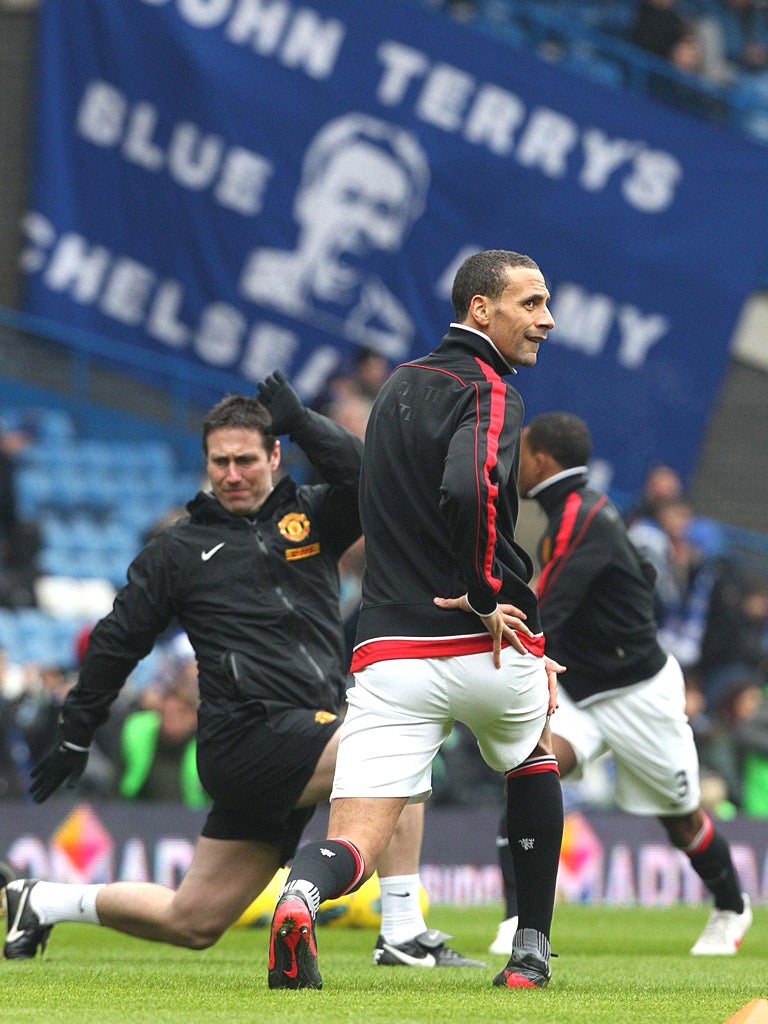Ferdinand and Terry is today's hot topic but time moves on
Out of form or in the stand, England's ageing centre-backs are a far cry from former glories

Rio Ferdinand and John Terry, on opposite sides of a public conflict, were again on different sides of the argument yesterday. While Ferdinand was wearing the shirt of Manchester United, part of a defence that was exposed as Chelsea surged ahead, Terry was wearing the tracksuit of Chelsea, only able to watch as his team-mates responded with soft generosity of their own.
The rift which exists between England's two leading centre-backs of the last decade framed yesterday's match. Ferdinand was the subject of boos and jeers from the Chelsea fans, as well as taunts about Anton. It was disgusting and disgraceful, but given modern standards of behaviour at football, not desperately surprising.
Ferdinand responded with a calm start; he did most of what was asked of him, and could have done little to stop either Jonny Evans' own-goal or Juan Mata's magical volley.
While he was powerless to prevent Chelsea's first two goals, Ferdinand was liable for the third. It was just five minutes after Mata's goal, when United most needed to secure their position in the game. But Mata swung in a free-kick for the right, and David Luiz darted to the near post to meet it. Ferdinand was caught two feet behind him. Luiz was free to head it, and the ball deflected off the trailing Ferdinand and into the net.
It is unlikely that the assured, commanding Rio Ferdinand of years gone could have been so negligent or so slow. The dominant Ferdinand would surely have not allowed such an affront to his defensive authority; he would have been quick, strong and ready, and repelled the danger.
But that was as bad as it got for Ferdinand, and for United. For the last 40 minutes they improved. As United had most of the ball, Ferdinand was rarely tested. When he was, he did well, holding up Daniel Sturridge, forcing him to shoot wide, and beating Fernando Torres to a near-post header.
It was Chelsea's defence which was examined from then on – like United's, it did not take too much pressure for them to concede three. This was Gary Cahill's debut, although in truth it could have been finished within 10 minutes but his trip on Danny Welbeck went unpunished. Cahill was playing instead of the man he is likely to replace long-term in Terry, who was out with a knee injury. While this removed what would have been a fascinating if potentially toxic sub-plot, it did mean a Chelsea defence less prepared for the test which it eventually failed.
Of course, it is unknowable whether Terry would have helped to preserve Chelsea's lead. But the belief and the rigour which he instils in his team-mates might just have made the costly errors less likely.
While the penalty that Sturridge conceded could be put down to the clumsy enthusiasm of a forward, the second was more obviously sloppy: Branislav Ivanovic was in the wrong position and, invited Danny Welbeck to win a penalty from him, an offer which was taken up.
And although any influence that Terry might have had on those goals is conjectural, he may well have had more of an influence on the equaliser. Ryan Giggs' left wing cross sailed over Cahill's head to Javier Hernandez, who had stolen space from David Luiz.
The Brazilian was playing left-sided centre-back, Terry's preferred role, and had the Chelsea captain been in the side he would, one imagines, have stuck tighter to Hernandez, and hurled himself in front of the striker to head the ball away. If there is one act that Terry defines himself around it is the desperate, diving near-post header, particularly when necessary, particularly when late in a game.
But this is all just guesswork. Terry's powers are fading just as much as Ferdinand's. The difference, yesterday, is that Ferdinand was on the pitch, part of a fragile defence, revealed as the defender he now is and not what he once was. Terry was sat in the stands, unable to keep goals out but also unable to let them in. Any influence he had was imagined, not real. Again, on the opposite side of the divide from Ferdinand.
Subscribe to Independent Premium to bookmark this article
Want to bookmark your favourite articles and stories to read or reference later? Start your Independent Premium subscription today.

Join our commenting forum
Join thought-provoking conversations, follow other Independent readers and see their replies